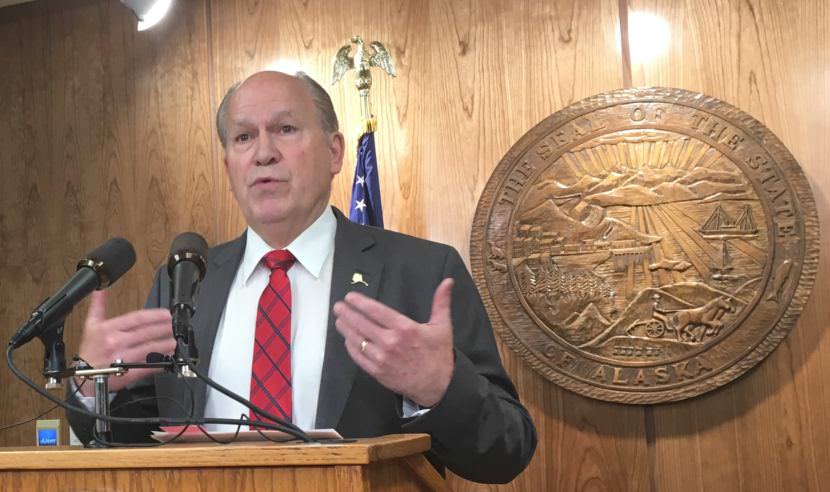
A breakdown in negotiations between House and Senate legislators Thursday resulted in lawmakers not passing a state operating budget in the first special session that ended Friday. So Gov. Bill Walker immediately called for a second special session, but is limiting the agenda to only the operating budget.
There were eight items on the first special session. The full Legislature only passed the budget for mental health before both chambers adjourned.
Walker said he is asking the Legislature to take these items in a more measured way – starting with only the operating budget.
“I received a lot of input from around the state from businesses, from business people – some actually came to Juneau to talk to me, to ask me, ‘Please, please, put one issue, put the operating budget on the call,’” Walker said.
Walker said his priority is to stop a state government shutdown, which will occur on July 1. He said it’s important not just to prevent pink slips to government workers, but to prevent harm to private industries that depend on public services.
“Commercial fishing is an example,” Walker said. “They spend a lot of money getting ready for the season. And someone said to me, they said – obviously who hadn’t commercial-fished – they said, ‘Well, if they lose 10 days, what’s the problem?’ That might be the 10 days that the fish are there. And so any day, any minute that’s lost during commercial season is very, very critical.”
The second special session began shortly after 1 p.m. Friday, after the Senate adjourned the first special session.
The Senate adjourned after budget negotiations broke down and the House combined the operating and capital budgets in a move condemned by the Senate majority and House minority.
House Speaker Bryce Edgmon, D-Dillingham, said it’s important that the Legislature not only passes a budget, but also passes a plan that brings how much the state spends in line with the money the government brings in. He said he doesn’t want to fight the same battle next year.
“Look into calendar year 2018, and an election year political environment that’s going to be much more complicated than it is this year,” Edgmon said. “You sort of put all those factors together and, you know, you go, ‘Why wouldn’t we take decisive action now?’”
Senate leaders expressed frustration that the House didn’t negotiate through today and instead passed a combined budget Thursday night they knew the Senate wouldn’t pass.
But Senate Finance Co-Chairman Lyman Hoffman, a Bethel Democrat, said there’s time to avoid a shutdown.
“Let’s focus on the people of Alaska instead of trying to get other items onto the agenda that are not on the agenda,” Hoffman said. “Let’s close this down and let’s get the people’s business done.”
But the divisions and animosity runs deep. House members accused the Senate of not negotiating. In particular, Homer Republican Rep. Paul Seaton said the House offered a 1.5 percent flat tax on employment and self-employment income. This was less than half the size of the original tax the House passed. But the Senate rejected it.
Walker said he still wants the Legislature to consider other issues after it passes an operating budget. That includes the capital budget and a long-term budget plan, as well as a new source of revenue like a broad-based tax. And he expressed disappointment the Legislature didn’t agree on a bill intended to reduce opioid overdose deaths, after both chambers passed different versions of the bill.
These items could be added to the special session later, or addressed in a future special session. Walker also said he wants a budget for capital projects passed within a month, as soon as July 1 as possible.
Andrew Kitchenman is the state government and politics reporter for Alaska Public Media and KTOO in Juneau. Reach him at akitchenman@alaskapublic.org.




